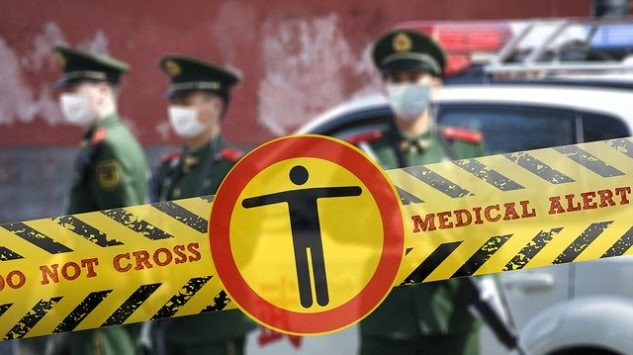Issue Briefs

The Economic Damage Of Coronavirus
By Paolo von Schirach
March 1st, 2020
WASHINGTON – The spreading coronavirus epidemic has already created an enormous challenge for the global economy. This epidemic is caused by an unknown new virus for which human beings have no immunity. For this reason, while this illness is very similar to a seasonal flu, its mortality rate is significantly higher. Hence the global scare.
Widespread restrictions
To date, there are no medical remedies for this new illness. Lacking other remedies, the countermeasures, beginning in China, (where it all started), have focused on lockdowns, quarantines and interruption of travel to and from the regions and countries affected. The goal is to slow down the spreading of the disease. Still, while this may be a sensible prevention policy from a public health standpoint, the economic impact has been devastating. Large parts of the Chinese economy have essentially been frozen by all these restrictions.
Frozen economy in China
Think about it. Lockdown affecting tens of millions of workers means that factories and offices are closed, workers do not work, goods are not produced, orders are not filled. Restaurants and hotels are empty, airlines cannot fly.
This prolonged work stoppage will amount to catastrophic economic losses for China, whose economy –let us keep in mind– was already rather anemic prior to this crisis, in some measure due to the negative impact of the tariffs war with the US.
Economic contagion
And this is not just affecting China. The reality of globalization means that we already have widespread economic contagion, even in countries only mildly affected (so far) by this new disease. Indeed, while relatively unscathed by the epidemic, the US is already suffering economically.
And this why. All US multinationals, and other smaller companies, depend on complex (and, it turns out, very vulnerable) supply chains centered in Asia. As the Chinese economy freezes, many US companies do not get their products delivered, and/or do not get critical parts and components for products assembled in the US. This is costly, and it negatively affected production schedules.
Sectors already affected
Beyond that, certain sectors of the US economy, such as leisure and business travel, hotels and airlines are already affected in a major way due to all the travel restrictions imposed by the authorities.
Furthermore, we can expect that the US oil industry will suffer devastating losses. With industrial production down in Asia, global oil demand collapsed and so did benchmark oil prices. The large and expanding (thanks to shale drilling) US oil industry supports dozens of medium sized companies and tens of thousands of high paying jobs. Many of these jobs are now in jeopardy. If the oil prices slump continues, expect major losses and bankruptcies in the US oil patch.
Additional contagion
The fact that new points of contagion have exploded in South Korea, Japan, Italy and Iran worries markets even more. These developments lead all experts to conclude that the coronavirus epidemic is now out of China, and it cannot be contained. Therefore, we should expect more countermeasures in the shape of travel restrictions and lockdown, and consequently additional harm to the global economy. Hence the financial markets panic and the deep losses experienced by Wall Street (the worst since 2008) in the last few days.
The road ahead
If we could have the reassurance that these extreme “Coronavirus Containment Measures”, while severe, were only temporary, then the world economy could adjust, absorb this hit, and get ready to restart soonest.
But the problem is that we do not know how long this epidemic will last. And this allows for the worst scenarios to proliferate. After the 2008 financial crisis exploded, the panic was caused by lack of knowledge regarding the extent of the financial shortfalls. How big were the losses for the banking sector? How many mortgage companies would go under? Who would be capable of surviving? The market panic was largely due to lack of reliable data.
However, the massive liquidity injection by the US Fed into the US economy, combined with massive rate cuts, helped to reassure the markets; and they gradually re-established confidence in the system. After those beneficial interventions, climbing back to normality was certainly painful; but everybody agreed that it was doable.
How long will this last?
In this coronavirus case, there is no clear end game. The health experts have no reassuring answers for this medical emergency. Lacking a cure, keeping infected individuals and areas isolated and blocking altogether travel and events where large numbers of people congregate seems a sensible way to slow down or contain the spread of this virus. The problem is that these prevention measures cause enormous economic losses, as the recent developments in China, South Korea, Japan and Italy clearly indicate.
More contagion, more restrictions
Should the epidemic spread from Italy to the rest of Europe in major way, and from Europe to other parts of the world, assuming similar restrictive policies adopted by additional countries, the economic damage caused by widespread freezing of production and world commerce would be incalculable.
For instance, in Iran, a severely under resourced country, the epidemic most probably cannot be contained. Will the virus travel from there to Central Asia, the Middle East and Africa? Scary scenario; but not impossible.
Without some good news, such as new data showing a global contagion slowdown and/or the announcement of a cure or vaccine that could be quickly administered, it is difficult to see how markets can stabilize and go back to normal.
Last but not least, should the epidemic spread to the US in a major way, (it is already here), all bets are off. If America stops, the world stops.
The views and opinions expressed in this issue brief are those of the author.
 |
Paolo von Schirach is the Editor of the Schirach Report He is also the President of the Global Policy Institute, a Washington DC think tank, and Chair of Political Science and International Relations at Bay Atlantic University, also in Washington, DC. |